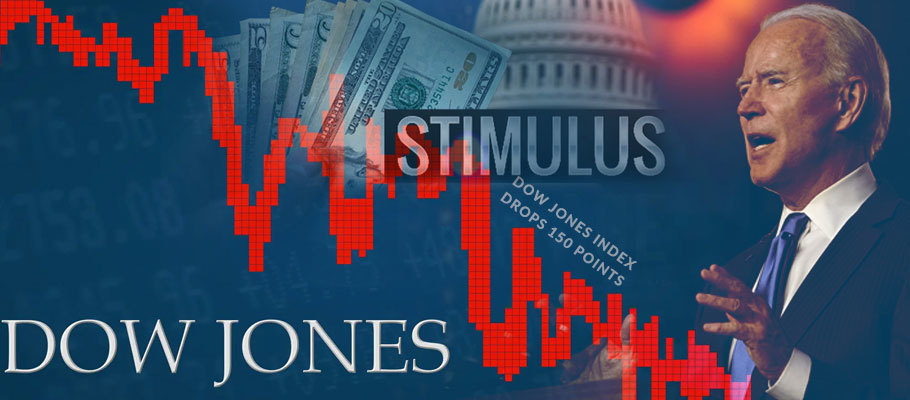
Published: January 18th, 2021
Stocks plunged on Friday, January 15, to see out a tough week that saw traders hold their cards close to their chests as they mulled over President-elect Joe Biden's vast $1.9 trillion stimulus proposal. The impressive figures from the U.S. banks' earnings did not help and only served to fuel the market's caravan further downslope.
As the markets closed on Friday, January 15, it was clear that the proposals put forth by the U.S. President-elect Joe Biden will have far-reaching effects. Stocks fell during the last day's trading as traders saw off a tough week.
Markets were seemingly weighing Biden's vast $1.9 trillion stimulus plans, the effects of the above-expected data from the U.S. banks' latest earnings report, and the uninspiring retail sales numbers.
The Dow Jones Industrial Average tanked significantly, losing 177.26 points or 0.6% to stand at 30,814.26. The day's last figure was a reprieve since the index had earlier lost more than 300 points during the day. The S&P 500 bled about 0.7% to close the day at 3,768.25, while the Nasdaq Composite lost almost a percent to stand at 12.998.50.
Chevron and Dow Inc., which both plunged more than 3%, pushed the 30-stock average lower. Energy stocks lost 4% cumulatively, recording the worst one-day drop since late November, while the financial sector tanked by 1.8%, piling more pressure on the S&P 500.
The slip among stocks in the financial sector came even with headline results that were above the forecasted figures. Seemingly, investors found reasons in the said reports' more nuanced details and the broader economic picture that awakened a cautious perception among them.
Overall, the Dow and Nasdaq etched weekly drops of 0.9% and 1.5%, respectively, ending four-week winning streaks. The S&P 500 also slid down some 1.5% for the week.
Biden's ambitious proposal, referred to as the American Rescue Plan, seeks to increase the federal unemployment payments to $400 per week and extend them through September. Besides, it plans an additional $1,400 direct payment to most Americans. The proposed stimulus also wants to extend the federal moratorium on evictions and foreclosures to September.
Biden's plan is advocating for $350 billion in aid to local and state governments and up to $70 million for programs covering COVID-19 testing and vaccination. It also seeks to increase the minimum federal wage bill to $15 an hour.
While addressing the nation from Delaware on Thursday, January 14, the president-elect said there is real pain pressuring the real economy. The pressure is pushing people to rely on paychecks and not investments, pay their bills, buy their meals, and provide for their children's needs, Biden added.
Glam as the proposal seems, a section of market analysts thinks the traders had stocked on the rumor and are preparing to now sell on the news. According to Tom Essaye, the founder and president of Sevens Report Research, the markets had already factored in most of what the president-elect's plan includes. It is not likely that the drop witnessed last week is entirely due to Biden's announcement, he added.
Tom said the plans for further historical stimulus, more federal quantitative easing, and coronavirus vaccines are all well known, meaning such catalysts no longer have the kind of positive influence on the stocks compared to a few months ago.
A third significant relief bill became apparent recently after the December labor market report painted a gloomy picture for job creation. Besides, the Democrats triumphed in the critical Senate runoff elections in Georgia. With the party holding a slight majority in both the House of Representatives and the Senate, Biden can now see through most of his election promises.
On Friday, January 15, the December economic figures did not do much to inspire investors who are already concerned about the winter surge of COVID-19 cases on the economy. The retail sales data was lower than predicted for December.
Similarly, the Empire Manufacturing Index, the Federal Reserve Bank of New York's monthly survey of manufacturers in the state, was also down.
The advance estimates of retail and food services sales for December 2020 stood at $540.9 billion, a 0.7% drop compared to the November figures. Market experts said the renewed measures imposed to slow the spread of COVID-19 slowed spending in restaurants and slashed the traffic to shopping malls significantly.
However, these figures are a little ominous than they appear. Excluding gasoline, automobiles, food services, and building materials, overall retails sales tanked 1.9% in December. These core retail sales figures correspond with the consumer spending aspect of the Gross Domestic Product (GDP).
The dismal retail report came in the wake of more bad news that the economy had slashed jobs in December, the first time in eight months. Besides, more job losses are likely in January after new unemployment benefits applications increased during the first week of the month.
These figures correspond with experts' assertion that the economic data for Q4 of 2020 highlights a slowdown in growth.
Overall, the past few weeks' events paint different outlooks for different people and segments of the economy. According to Jim Paulsen, the market strategist at Leuthold Group, low-income workers and the elderly may burn more than anyone once the economy begins to feel the effects of the massive stimulus.
Jim predicts an overheated economy with inflation so high that it might force the Federal Reserve to apply drastic measures to contain it. However, Jim thinks it is not all gloom for everyone. He said that the massive selloffs that may follow would make investors both near-term winners and medium-term losers.
Banks, however, would emerge as the overall winners.
On Friday, January 15, the stock markets closed a tough week that saw all indexes record significant decreases. The Dow Jones, Nasdaq, and the S&P 500 all dropped between 0.5% and 1.5% during sessions that saw the energy and banking sector stocks bear the brunt of the proposed massive stimulus and the low economic data for December 2020.